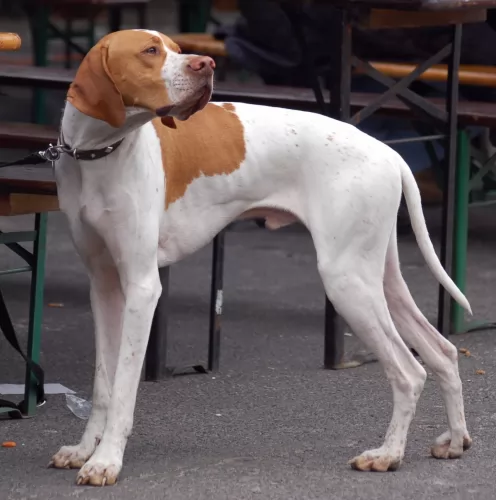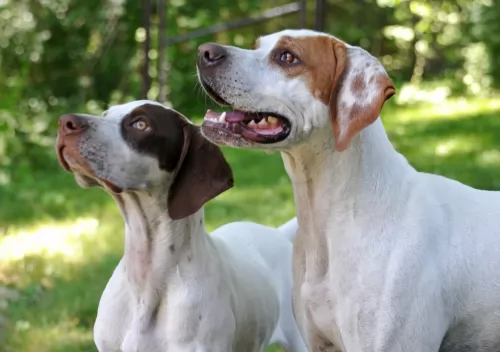 Petzlover
Petzlover English Pointer is originated from United Kingdom but Nova Scotia Duck-Tolling Retriever is originated from Canada. English Pointer may grow 16 cm / 7 inches higher than Nova Scotia Duck-Tolling Retriever. English Pointer may weigh 11 kg / 25 pounds more than Nova Scotia Duck-Tolling Retriever. Both English Pointer and Nova Scotia Duck-Tolling Retriever has same life span. Both English Pointer and Nova Scotia Duck-Tolling Retriever has same litter size. English Pointer requires Low Maintenance. But Nova Scotia Duck-Tolling Retriever requires Moderate Maintenance
English Pointer is originated from United Kingdom but Nova Scotia Duck-Tolling Retriever is originated from Canada. English Pointer may grow 16 cm / 7 inches higher than Nova Scotia Duck-Tolling Retriever. English Pointer may weigh 11 kg / 25 pounds more than Nova Scotia Duck-Tolling Retriever. Both English Pointer and Nova Scotia Duck-Tolling Retriever has same life span. Both English Pointer and Nova Scotia Duck-Tolling Retriever has same litter size. English Pointer requires Low Maintenance. But Nova Scotia Duck-Tolling Retriever requires Moderate Maintenance
 We can find records for pointers from 17th century. Breeds such as Old Spanish and Portuguese Pointer were set in to England from European Mainland. In 1800s they were brought to America and then they slowly developed their hunting skills and in 1910 they became an excellent bird hunter. In 1936 Modern American Kennel was established and they bred pointers in large quantities. They are very popular in southern United States and are called as "bird dog". Pointers are good in hunting birds like pheasant and grouse. They got their name because of their special skills in hunting.
We can find records for pointers from 17th century. Breeds such as Old Spanish and Portuguese Pointer were set in to England from European Mainland. In 1800s they were brought to America and then they slowly developed their hunting skills and in 1910 they became an excellent bird hunter. In 1936 Modern American Kennel was established and they bred pointers in large quantities. They are very popular in southern United States and are called as "bird dog". Pointers are good in hunting birds like pheasant and grouse. They got their name because of their special skills in hunting.
 The Nova Scotia Duck Tolling Retriever dog was bred in the 19th-century in Nova Scotia, Eastern Canada.
The Nova Scotia Duck Tolling Retriever dog was bred in the 19th-century in Nova Scotia, Eastern Canada.
They were used as hunting dogs. Known as the ‘Toller’, the dog was at first referred to as the Little River Duck Dog but it was in 1945 that it became officially recognized by the Canadian Kennel Club as a pure breed.
The dog is a mix of retriever, setter, spaniel and possibly a farm collie mix breed. It was in 1980 that the breed gained national recognition, being declared the provincial dog of Nova Scotia in 1995.
 Pointer has a long head and its body is perfectly suitable for hunting. In hunting the pointers shows hunter the direction of the bird and also they will go and get them after they were shot. They are well known for their speed, energy and continuous working. Pointers are also a good companion dog and love the family members so much. It is very easy to groom them as they have short coat. They are very alert and excellent watch dog.
Pointer has a long head and its body is perfectly suitable for hunting. In hunting the pointers shows hunter the direction of the bird and also they will go and get them after they were shot. They are well known for their speed, energy and continuous working. Pointers are also a good companion dog and love the family members so much. It is very easy to groom them as they have short coat. They are very alert and excellent watch dog.
If pointer is not set in huntng then they should be given lots of exercise daily. Pointers love to play and run with children. They will give a good company for cyclists. Pointers show their talents in dog shows especially in obedience and field trials. They will not worry about the crowd surrounding them and performs well. In performing at public, pointer will show perfect attention to its master. Pointer must be trained slowly from its puppyhood to get good results.
 The Nova Scotia Duck Tolling Retriever is a medium-sized gundog. Both male and female stand at about 42 to 54cm in height and they weigh anything from 17 to 23kg.
The Nova Scotia Duck Tolling Retriever is a medium-sized gundog. Both male and female stand at about 42 to 54cm in height and they weigh anything from 17 to 23kg.
This beautiful dog is looked upon as the smallest of the retriever dogs. He has a remarkable medium-length, feathery red, copper or golden coat with some white markings and a long feathery tail with medium length, floppy ears. The coat will need brushing twice a week.
He is a powerful dog and also agile with a somewhat worried expression on his face. The expression becomes bright and animated when he is busy working and you’ll notice that the feathery tail is held high with confidence and delight when he is busy working or doing some activity he loves.
The Nova Scotia Duck Tolling Retriever is an intelligent, alert dog who is eager to please its owners.
They are affectionate dogs too, making a splendid family pet. If you’ve got kids in the home, you can trust this dog to get on well with them.
He is energetic, thriving on both physical and mental stimulation. He’ll love a walk every day as this will give him the chance to get out and sniff around. He won’t be content though with just a walk and will want ball games, walks in the park, hikes and swimming. This dog loves water and is well equipped for it with his double coat and webbed paws.
 Pointer is a wonderful kid friendly dog and a nice companion. Also he is very energetic,fun-loving and an excellent watchdog. Pointers are very courageous as well as obedient. They can work for a very long time. Early socialization will make them with a good behaviour.
Pointer is a wonderful kid friendly dog and a nice companion. Also he is very energetic,fun-loving and an excellent watchdog. Pointers are very courageous as well as obedient. They can work for a very long time. Early socialization will make them with a good behaviour.
They will be happy if they are given a fenced yard to play and spend their natural energy. They will not have a good behaviour in apartment living. Pointers always likes to be with some one in his family. They are suitable for areas having hot weather and they will not do better in cold weather.
Pointers have very high intelligence and thus they are very easy to train. Good behaviours must be taught to them and the main word they must learn is "NO". They should stop what they are doing when they hear the word "NO" from you. "Sit" is another important word they should learn. Training should be given friendly and not compelling them to do it. Giving reward to them will make them happy and give more interest in training.
 Your Toller is a high energy dog, and with the right family he is going to be an absolute joy to have. Give him lots of activities to stimulate him physically and mentally as he is an intelligent dog.
Your Toller is a high energy dog, and with the right family he is going to be an absolute joy to have. Give him lots of activities to stimulate him physically and mentally as he is an intelligent dog.
He is playful and social and full of life, although he is wary around strangers. Just like with most dogs, he will need training and socialization to round him off, making him obedient and well balanced.
With this good-natured pet, you will have a wonderful family friend and enthusiastic sport companion.
 Pointers face health problems such as gastric torsion, hypothyroidism and canine hip dysplasia. Overweight will also lead to many health problems in them. Other problems seen in them are cardiomyopathy, ectropion and progressive retinal atrophy.
Pointers face health problems such as gastric torsion, hypothyroidism and canine hip dysplasia. Overweight will also lead to many health problems in them. Other problems seen in them are cardiomyopathy, ectropion and progressive retinal atrophy.
They have the chances to get several skin disorders which leads to hairfall. Follicular Dysplasia is a hereditary disorder which causes hairfall. Special shampoos or lotion to combat the dry skin should be used to overcome this problem.
 These dogs are robust, but certain genetic disorders do occur in the breed because of the smallish gene pool. Some of the biggest health problems they face are hip dysplasia and progressive retinal atrophy.
These dogs are robust, but certain genetic disorders do occur in the breed because of the smallish gene pool. Some of the biggest health problems they face are hip dysplasia and progressive retinal atrophy.
This eye disease is all about a group of degenerative eye disorders that cause blindness in both eyes of the dog.
The first symptom of this disease is night blindness where you see your dog being reluctant to go outside or to go up and down stairs in dim light. The surface of the eyes will get that cloudy, glazed-over look and as the disease progresses, you’ll find your pet bumping into things.
Mercifully it isn’t painful but you will need to get your pet to the vet to manage the condition.
 Normally puppies require more food when compared with adult to meet their growth needs. The food given to the pointer puppy must contain vitamins, carbohydrates and minerals. Also the food given to his mother should be continued to the puppy as to avoid digestive problems for the puppy. If it is needed to change the food then it should be done in a step by step process.
Normally puppies require more food when compared with adult to meet their growth needs. The food given to the pointer puppy must contain vitamins, carbohydrates and minerals. Also the food given to his mother should be continued to the puppy as to avoid digestive problems for the puppy. If it is needed to change the food then it should be done in a step by step process.
Pointer can be fed one or two times a day. Usally small meal is given in morning and full meal will be given in the evening. But in case if they will be left alone for the whole day then morning food shall be a full meal. They can be fed meat of goat, pork, fish and woodcock. Brown rice is a good food for pointer.
Pointers will be happy if they are always with their family. They enjoy when they are taken outside for playing or camping. Puppies don't need much exercise as adults need. Adults should not be fed too much as it will lead to overweight.
When pointer is given proper exercises and training they will be a very good mannered dog. They are very active and intelligent dogs and hence require exercise and training regularly. The breed was developed to be a hunting dog and can work continuously in a day. Pointers should be exercised a minimum of an hour per day. They will be happy to run along with your bicycle and playing frisbee with you.
 Tollers are energetic dogs and you won’t have to extend a second invitation to this dog to join you on your walks, hikes, hunting and swimming. It is perhaps why he is better suited to country living as opposed to living in the city.
Tollers are energetic dogs and you won’t have to extend a second invitation to this dog to join you on your walks, hikes, hunting and swimming. It is perhaps why he is better suited to country living as opposed to living in the city.
You want to ensure the best food for your four-legged friend, but the idea is to keep things simple and nutritious for your dog.
Your pet can’t tell you when he’s got a stomach-ache from eating the wrong foods so you have to be careful what you feed him. You want to make sure that the food you give your dog is balanced for the stage of life he or she is in – puppy, young adult, pregnancy, ill dog or senior dog.
You’ve also got to see whether your dog is small or large, active or a couch-potato type of dog, and choose commercially manufactured foods that cater for the kind of dog he is.
It is fine to feed your dog a kibble food or you can mix in some chopped up boiled chicken, brown rice or pasta and some vegetables such as carrots, sweet potatoes and spinach. Some raw meat added in when you can afford it, will also do your pet the world of good.
You can see from this diet, it is uncomplicated, plain, wholesome food and will do your pet good.
Always be careful of bones with your dog and speak to your vet first before you opt to give your dog bones.
Never leave your pet without a constant supply of fresh, cool water.
Both dogs and owners benefit when a dog has been trained and socialized. The dog is balanced and obedient and a stronger relationship develops between owner and dog because of the dog being well behaved. The Nova Scotia Duck-Tolling Retriever is an intelligent dog so he won’t have any trouble with training.